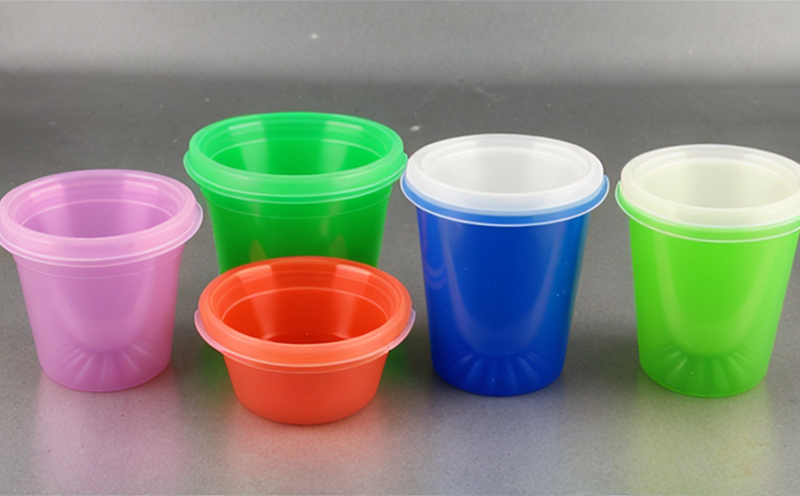ASTM D1929 Ignition Temperature Testing of Disposable Plastics
The ASTM D1929 standard is a crucial method used to determine the ignition temperature of thermoplastics, which includes many disposable plastics. This test evaluates the resistance of these materials to spontaneous combustion under controlled conditions. Understanding the ignition temperature is essential for quality managers and R&D engineers as it ensures product safety and compliance with regulatory requirements.
In the realm of polymer and plastics testing, especially for disposables like surgical gloves or plastic utensils, ensuring that materials do not ignite easily can prevent fires in healthcare settings, food service environments, and other areas where such items are used. The ignition temperature provides a quantitative measure to assess how resistant these plastics are to high temperatures.
The ASTM D1929 test involves subjecting the material specimens to gradually increasing temperatures until they reach their point of ignition. This process is critical for developing safer products that meet consumer and regulatory expectations. For compliance officers, knowing this temperature helps them ensure that all products undergo rigorous testing before being approved for market release.
The significance of ASTM D1929 extends beyond just safety; it also plays a role in product design and development. By understanding the ignition temperatures of various plastics, manufacturers can choose materials that are not only safe but also meet specific performance criteria such as durability or flexibility. This knowledge is particularly important for R&D teams who need to balance multiple factors when selecting new materials.
For procurement departments, this test ensures they source high-quality materials by verifying their safety through independent testing laboratories like ours. With increasing focus on sustainability and recyclability in the plastics industry, ensuring that even disposable items are safe is a key consideration for forward-thinking organizations.
The ASTM D1929 test is just one example of how advanced testing plays a vital role in maintaining standards across various sectors. By providing accurate data about material properties like ignition temperature, labs contribute significantly to enhancing product safety and regulatory compliance worldwide.
Why It Matters
The ASTM D1929 Ignition Temperature Testing of Disposable Plastics is essential for ensuring the safety of products in use. In healthcare settings or food service environments, where disposable plastics come into direct contact with people and potentially flammable materials, preventing spontaneous combustion could save lives.
- Reduces risk of fires caused by ignition of plastic disposables
- Aids in compliance with regulatory standards for safety
- Supports product development by providing insight into material behavior under heat stress
- Enhances brand reputation through adherence to stringent testing protocols
The results from this test are used not only internally within organizations but also shared with external stakeholders such as regulators and customers who value transparency about the safety features of their purchased products.
Scope and Methodology
| Test Parameters | Apparatus | Procedure |
|---|---|---|
| Gradual heating of specimen to ignition temperature | Thermogravimetric Analyzer (TGA) | Specimen is placed in the TGA instrument, which heats it incrementally while monitoring mass changes indicative of ignition. |
| Measurement of mass loss during heating | Differential Scanning Calorimeter (DSC) | The DSC tracks thermal energy absorbed or released by the specimen as temperature increases. |
| Data analysis for determining ignition point | Computational software | Software processes data from TGA and DSC to calculate the precise ignition temperature. |
The ASTM D1929 test requires precise measurement techniques to ensure accurate results. Key steps include preparing specimens according to specified dimensions, placing them into a controlled environment where they are subjected to gradual heating until ignition occurs. The apparatus used includes Thermogravimetric Analyzers (TGA), Differential Scanning Calorimeters (DSC), and computational software for data analysis.
This method is critical because it provides objective measurements that can be replicated consistently across different labs, ensuring reliability in determining the ignition temperature of various plastics.
Competitive Advantage and Market Impact
- Ensures compliance with international standards such as ASTM D1929
- Provides accurate data that can differentiate your products from competitors in terms of safety features
- Aids in meeting regulatory requirements which is increasingly important for global markets
The ability to conduct rigorous ASTM D1929 testing gives companies a competitive edge by ensuring their products are among the safest on the market. This can lead to increased customer trust and loyalty, as well as opening up opportunities for expanding into new regions with stringent safety regulations.
- Helps manufacturers stay ahead of changing consumer expectations regarding product safety
- Facilitates innovation by providing insights into material properties that could be leveraged for developing safer products
- Enhances corporate image through demonstrated commitment to high standards in manufacturing processes
In today’s highly competitive global market, being able to demonstrate adherence to stringent testing protocols like ASTM D1929 can be a significant differentiator. It shows that your company takes product safety seriously and is committed to meeting the highest industry standards.





